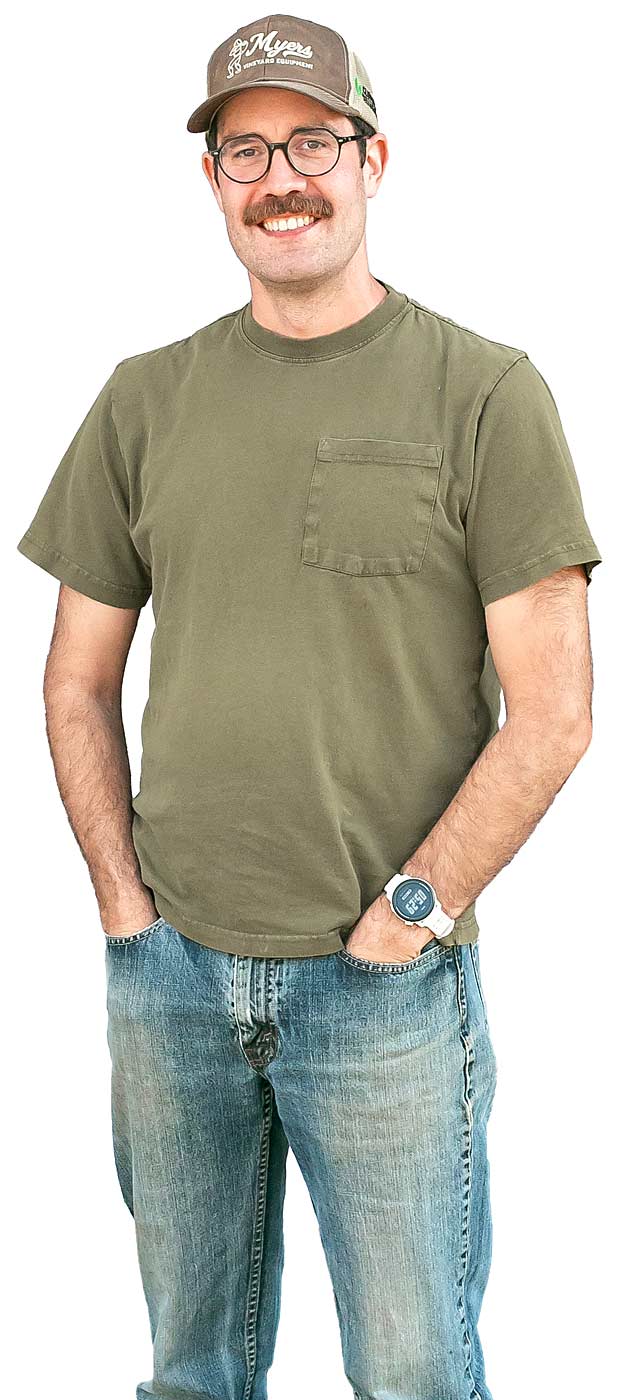family background/ Joe grew up on a family vineyard in Hood River and graduated with a horticulture degree specializing in viticulture from Oregon State University. He’s married to Krista and is the son of Robin and Rich Cushman.
age/ 36
hometown/ Hood River, Oregon
crop/ grapes
role/ director of operations
business/ Threemile Vineyard, The Dalles, Oregon

What were your first experiences in ag?
We had a family farm in Hood River that my dad and grandpa planted back in the ’80s with grapes. It’s one of the earliest vineyards in the Columbia River Gorge. I grew up working summers and winters doing pruning, shoot positioning and picking.
My dad and grandpa were in the wine industry, so we did a lot of picking at my family’s vineyard and then at other vineyards all over the region. I remember my dad would throw me in the truck, we’d go out to the field and pick grapes, getting sticky using wooden bins back then.
Then we’d take the fruit back to the winery and unload with a forklift. It wasn’t until way later in life that I realized what we were doing was part of a much bigger industry.
What did you study in college?
I studied anthropology for a short while in college, and I learned about the agricultural revolution and how humans developed modern agriculture. Learning the history about something I already experienced motivated me to switch career plans.
I jumped back into horticulture because a lot of those earlier memories came back to me. I wanted to do it, and, specifically, I wanted to do a really good job of it. One of my favorite things in college was the field trips to other people’s farms to look at different production systems or try to figure out problems.
All the while, I could hold on to my curiosity and wonder and look at something different from what my grandpa did for 30 years
What do you do in your job?
As operations director, communication is probably the most important thing that I do now, and that’s something I’ve really had to learn. After I started out as a viticulturist, then progressed to director, I learned how the different pieces of the vineyard and business work together. And it’s all about communication, even if it’s bad news.
One lesson I had to learn pretty early on with this role is that you need to just get it all out there and check in with everybody. You need to make sure your team is making the right decisions and that they’re communicating what they need so they can be the most successful they can be.
Even if half of your crop gets eaten by birds, or there’s a heat wave, or whatever else, you’ve got to network and communicate.
What advice do you have for other young growers?
Learn plant science, biology, botany and physiology, and understand what’s going on at a farm from a physiological and phenological perspective. Those are probably the most important things I know how to do, and that’s kind of what sets me apart from other managers of large organizations with lots of moving pieces.
For instance, if a plant is expressing symptoms, I need to be able to diagnose it quickly. If I can’t, I need to recognize the problem and call in someone who can identify it — either back at the university, in private industry, your neighbors, or whatever.
Plant science and biology are probably the most critical things that I learned and know. Then after that, honestly, math. Math, man, lots of statistics and spreadsheets, especially for larger operations. There’s a lot of mental math that a grower intuitively understands after working in the industry, but larger farms with more shareholders have to be able to quantify that.
And so, being able to create a data set, look at trends, make predictions and share that information with people is critical for large commercial operations. Excel is the tool I use most in my job. Excel and email.
There are a lot of good data collection tools in ag, but they just spit out columns and columns of data that you have to digest, make predictions and share with other members of your organization. Ultimately, who cares what you think? You have to be able to prove what’s going on at the farm with your data that you’ve collected.






Leave A Comment